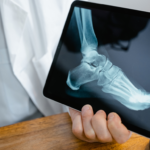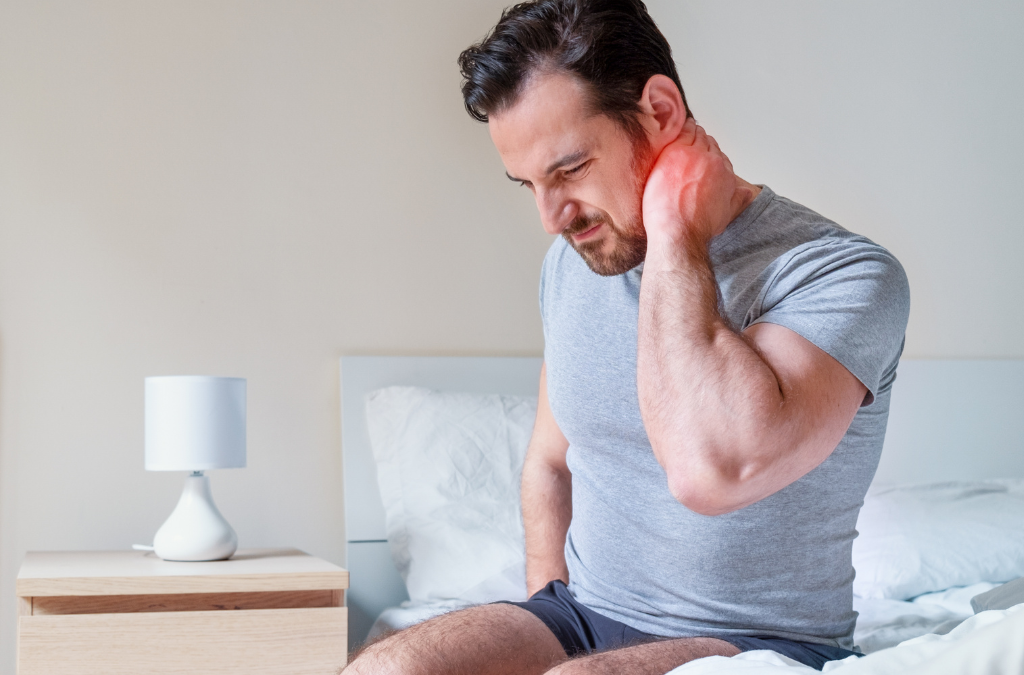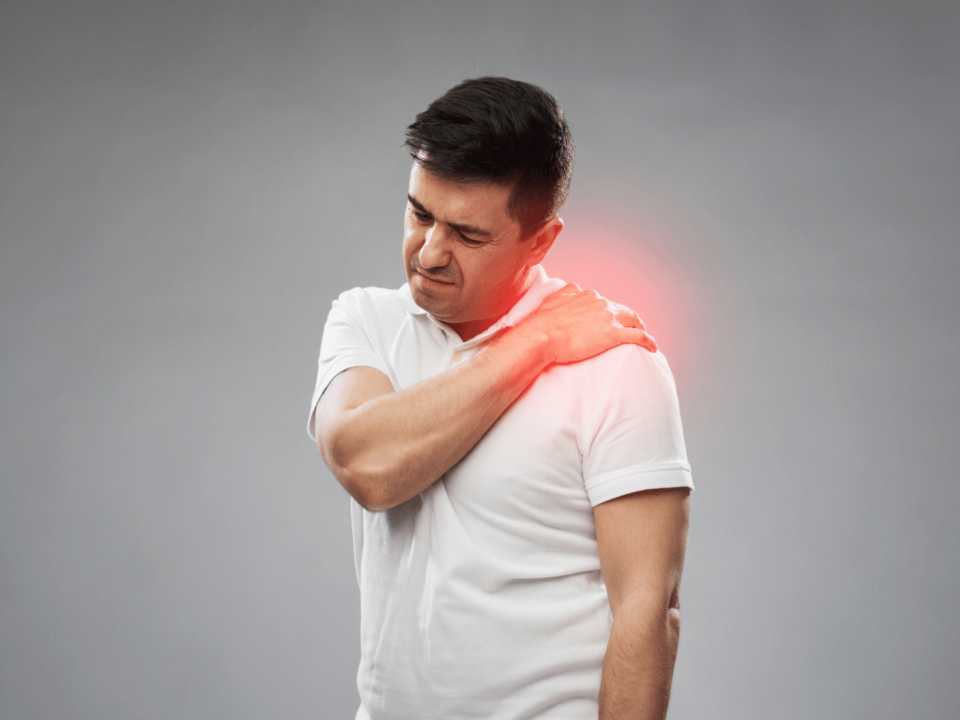
Nutritional Requirements for Diabetic Foot Ulcer: A Tailored Approach to Keeping Your Feet Healthy
October 26, 2023
The Patient’s Guide to Podiatric Surgery: Expectations and Outcomes
November 8, 2023How to Relieve a Stiff Neck After Waking Up
Waking up with a stiff neck can put a damper on your day from the very start. The discomfort and limited range of motion can make simple tasks feel like a challenge. Thankfully, there are steps you can take to relieve a stiff neck and prevent it from happening again in the future. In this article, we will explore the causes of a stiff neck, immediate relief methods, long-term strategies for prevention, and when it is necessary to seek medical attention.
Understanding the Causes of a Stiff Neck After Waking Up
A stiff neck can be caused by various factors, including poor sleep positions, pillow types, and stress. Understanding the underlying causes can help you address the issue more effectively.
The Role of Sleep Positions in Neck Stiffness
The position you sleep in plays a significant role in neck stiffness. Sleeping with your neck in an awkward or unsupported position can lead to muscle strain and tension. It is important to maintain proper alignment of your head, neck, and spine while sleeping.
When you sleep on your stomach, for example, your neck is often twisted to one side for an extended period of time. This can strain the muscles and ligaments in your neck, causing stiffness and discomfort. Sleeping on your back or side with a supportive pillow can help keep your neck in a neutral position and reduce the risk of developing a stiff neck.
Additionally, the quality of your mattress can also affect your sleep position and contribute to neck stiffness. A mattress that is too firm or too soft may not provide adequate support for your body, leading to improper alignment of your spine and neck. Investing in a mattress that suits your individual needs and preferences can greatly improve your sleep quality and reduce the risk of waking up with a stiff neck.
Impact of Pillow Types on Neck Health
The type of pillow you use can also contribute to neck stiffness. A pillow that is too high or too low can disrupt the natural curvature of your spine, leading to discomfort. Finding a pillow that supports the natural alignment of your neck and provides adequate support is crucial for neck health.
There are various types of pillows available on the market, each designed to address different sleep needs. Memory foam pillows, for example, contour to the shape of your head and neck, providing personalized support and relieving pressure points. Feather pillows, on the other hand, offer a soft and adjustable option for those who prefer a more traditional feel. It is important to choose a pillow that suits your preferred sleep position and provides the right level of support for your neck.
In addition to pillow type, the age and condition of your pillow can also impact its effectiveness in preventing neck stiffness. Over time, pillows can lose their shape and support, causing your neck to be improperly aligned during sleep. It is recommended to replace your pillow every 1-2 years to ensure optimal neck health and prevent stiffness.
The Connection Between Stress and Neck Pain
Stress can have a significant impact on our physical health, including our necks. When we experience stress, our muscles tend to tense up, resulting in muscle strain and tension in the neck area. Understanding stress management techniques, such as relaxation exercises or therapy, can help alleviate neck pain caused by stress.
When we are stressed, our bodies release stress hormones that can cause our muscles to contract and tighten. This can lead to the development of trigger points in the neck muscles, which are small knots of muscle fibers that can be painful and restrict movement. Chronic stress can also weaken the immune system, making us more susceptible to infections and inflammation, which can further contribute to neck pain.
Engaging in stress-reducing activities, such as practicing mindfulness meditation, deep breathing exercises, or engaging in regular physical activity, can help relax the muscles and reduce tension in the neck. Additionally, seeking professional help, such as therapy or counseling, at Center For Specialty Care, we can provide valuable tools and techniques for managing stress and preventing its negative impact on our physical health.
It is important to note that while addressing the underlying causes of a stiff neck can provide relief, it is always recommended to consult with a healthcare professional if you are experiencing persistent or severe neck pain. They can provide a comprehensive evaluation and recommend appropriate treatment options tailored to your specific needs.
Immediate Relief Methods for a Stiff Neck After Waking Up
If you wake up with a stiff neck, there are several methods you can try for immediate relief.
Waking up with a stiff neck can be a frustrating and uncomfortable experience. The limited range of motion and constant ache can make it difficult to go about your daily activities. However, there are ways to alleviate the stiffness and find relief.
Gentle Neck Stretches and Exercises
Performing gentle neck stretches and exercises can help relieve muscle tension and improve flexibility. Slowly move your head in different directions, such as side to side and up and down, to help loosen the muscles in your neck.
One effective stretch is the neck tilt. Sit or stand up straight, then slowly tilt your head to one side, bringing your ear closer to your shoulder. Hold this position for 15-30 seconds, then repeat on the other side. This stretch targets the muscles on the sides of your neck, providing relief from stiffness.
In addition to stretches, exercises like neck rotations and chin tucks can also help alleviate stiffness. Neck rotations involve slowly turning your head from side to side, while chin tucks involve gently pulling your chin towards your chest. These exercises help improve blood circulation and release tension in the neck muscles.
Heat and Cold Therapy
Applying heat or cold to your neck can provide temporary relief from stiffness. Use a heating pad or warm towel to relax tense muscles, or apply an ice pack wrapped in a cloth to reduce inflammation.
Heat therapy works by increasing blood flow to the affected area, promoting relaxation and reducing muscle stiffness. You can apply heat using a heating pad set on a low or medium setting, or by taking a warm shower. The warmth helps soothe the muscles and eases the discomfort.
Cold therapy, on the other hand, helps reduce inflammation and numbs the area, providing relief from pain. You can use an ice pack wrapped in a cloth and apply it to the stiff area for 15-20 minutes at a time. Remember to never apply ice directly to the skin, as it can cause ice burns.
Over-the-Counter Pain Relievers
If your discomfort persists, over-the-counter pain relievers, such as ibuprofen or acetaminophen, can help reduce pain and inflammation in the neck area. However, always follow the recommended dosage and consult with your doctor if you have any underlying health conditions.
Over-the-counter pain relievers can be a helpful option when dealing with a stiff neck. They work by reducing pain signals and decreasing inflammation in the affected area. It is important to carefully read and follow the instructions on the packaging, and if you have any concerns or questions, consult with a healthcare professional.
It’s worth noting that while over-the-counter pain relievers can provide temporary relief, they do not address the underlying cause of the stiffness. If your stiff neck persists or worsens, it is advisable to seek medical attention to determine the root cause and explore appropriate treatment options.
Long-Term Strategies to Prevent Morning Neck Stiffness
While immediate relief methods can provide temporary comfort, adopting long-term strategies can help prevent morning neck stiffness from occurring in the first place.
Improving Your Sleep Posture
Ensuring that your sleep posture promotes proper alignment of your head, neck, and spine is essential for preventing neck stiffness. Avoid sleeping on your stomach, as this can strain your neck muscles. Instead, try sleeping on your back or side with a pillow that supports the natural curve of your neck.
Choosing the Right Pillow and Mattress
Investing in a pillow and mattress that provide adequate support and promote good spinal alignment is crucial for preventing neck stiffness. Look for pillows and mattresses specifically designed to support the neck and spine, taking into consideration your preferred sleep position.
Regular Exercise and Neck Health
Engaging in regular exercise helps improve flexibility, strength, and overall neck health. Incorporate exercises that target the neck and upper back muscles, such as neck rotations and shoulder shrugs, into your exercise routine to prevent stiffness and tension.
When to Seek Medical Attention for a Stiff Neck
In most cases, a stiff neck can be relieved with home remedies and self-care techniques. However, there are instances when seeking medical attention at Center For Specialty Care is necessary.
Symptoms That Require Immediate Medical Attention
If you experience severe neck pain accompanied by other symptoms such as fever, headache, and nausea, it is important to seek immediate medical attention. These symptoms could be indicative of a more serious underlying condition, such as meningitis.
The Role of Physical Therapy in Treating Chronic Neck Stiffness
If your neck stiffness persists or becomes chronic, your healthcare provider may recommend physical therapy. Physical therapy can help improve strength, flexibility, and range of motion in your neck, relieving stiffness and discomfort.
Surgical and Non-Surgical Treatment Options
In rare cases where conservative treatments are ineffective, surgical or non-surgical interventions may be recommended. Your healthcare provider can determine the most appropriate treatment approach based on the underlying cause of your neck stiffness.
By understanding the causes of a stiff neck and adopting proper preventive measures, you can wake up without discomfort and start your day on the right foot. However, if your symptoms persist or worsen, do not hesitate to seek medical advice. Your health and well-being should always be a top priority.




